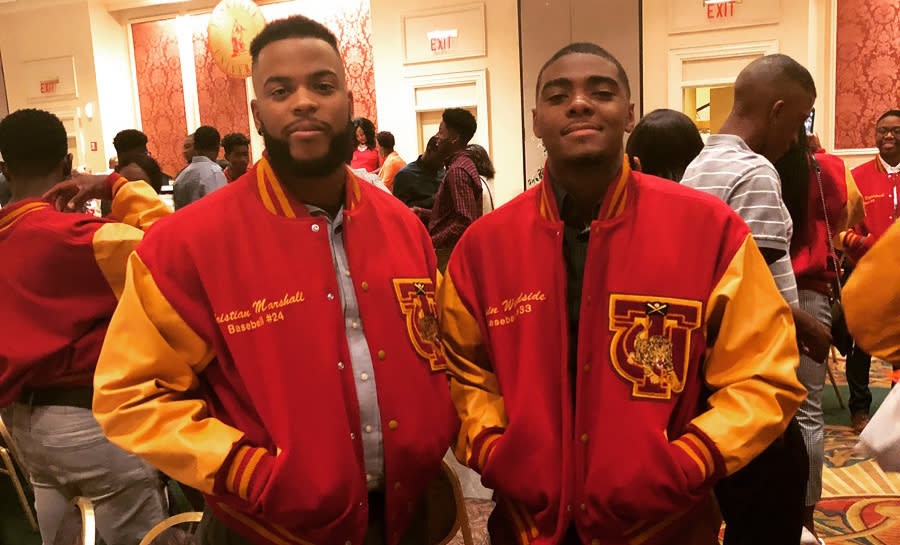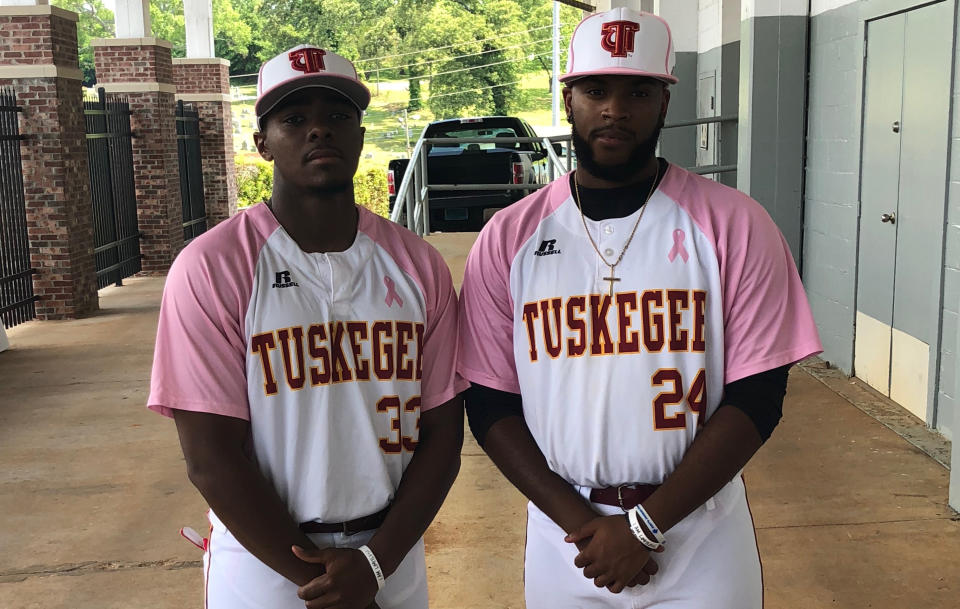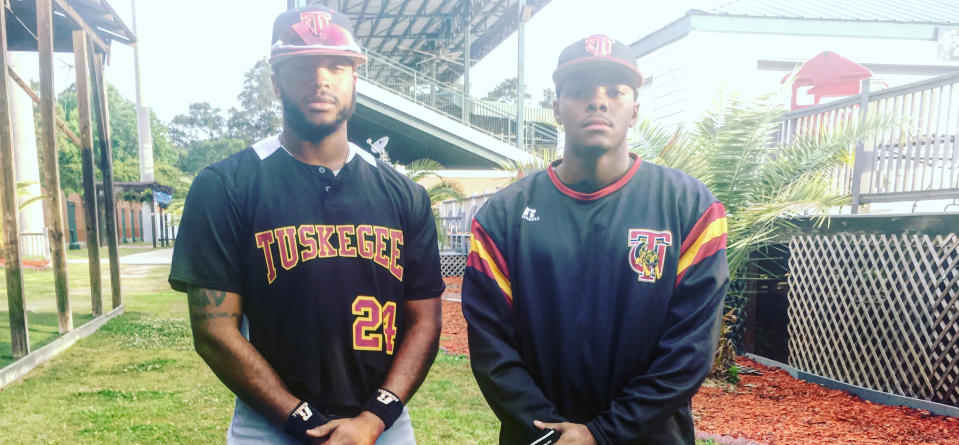While Plan A is baseball, Plan B is changing the world for these two aspiring mechanical engineers

When MLB commissioner Rob Manfred read aloud the names of the next generation of ballplayers, Christian Marshall was most of a continent away, riding a city bus in Pasadena, California. It’s 25 minutes from the room he rents to his summer job, where he tests parts for NASA’s next trip to Mars, and 25 minutes back, not that he’d complain, “It’s a straight shot,” he said, no transfers.
When moms shrieked and dads sobbed and their boys made do with stiff new caps, and when the former big leaguers predicted on television those young men would really be something one day, Elgin Woodside pushed out one more rep at a gym in Bridgeport, Connecticut. Then another. “First time in the whole Northeast,” he said. “It’s all right. Kinda cold.” He’s in nearby Stratford for the summer, assessing, among other things, the aerodynamics of helicopters for Lockheed Martin.
They’re ballplayers, too. Teammates at Tuskegee University in Alabama, where they will be seniors in the fall. Baseball rats from the New Orleans MLB Urban Youth Academy. Best friends from out near Pontchartrain Park. Aspiring mechanical engineers on summer internships. So, to be honest, if it turns out they’re not quite skilled enough to change the game of baseball, which is still Plan A, they’ll settle for changing the world, Plan B. Unless both is an option.
“Seems like yesterday they first walked through that gate,” said Eddie Davis, the baseball academy’s director.
The academy opened in 2012, part of the block-by-block, brick-by-brick rebuild after Hurricane Katrina. They’d restored old Wesley Barrow Stadium. There were fields and batting cages and lockers and gear and coaches in there. There were teammates. There were friends. There were mentors. There were diversions. Honest, safe paths were in there.
That gate was open for anyone.
The summer after his freshman year of high school, Christian walked through, among the first. Tall and strong for his age, he already was a varsity ballplayer, a switch-hitting corner infielder who pitched, too. Eddie Davis knew Christian’s mother, Valkessha, from high school, before Eddie left New Orleans to play college ball and five minor-league seasons with the Los Angeles Dodgers.
“She got me through chemistry,” Davis said. “I’d say, ‘Lean down so I can see your answers, Val!’”
So he knew Christian’s story too, why Valkessha and her four children had returned to New Orleans from Arkansas, why Christian might have some hard days, why footwork and sliders maybe weren’t the only reasons Christian showed up one day, then the next, then the next, and why many nights Christian was about the last to leave.
“Baseball was my coping mechanism,” Christian said. “With baseball, I knew what I wanted. I used that as an internal strength.”
In the Marshall home, mom drove the academics. Dad, Chris, drove the baseball. He was Christian’s backyard catch partner. He was his coach. He was the dreamy conversations about big leaguers and long home runs and ballgames on the radio, until he wasn’t anymore.
“Who knows why he made that decision,” Christian said. “Something inside. Something hurting him, I guess. Was a Saturday night, I think. I was in my room, playing. Just kinda heard the gunshot go off.”
Christian was 13. He had three little sisters, one not much more than a baby.

“My mom, I don’t really think she was OK, but she was going to be OK,” he said. “Because she had four kids to support. She made sure she was. She made sure we were all together, that we were all right.”
A couple years later, he was in the hallways at Xavier University of Louisiana, between classes of a pre-college engineering program. A boy about his age, about his build, stopped him, pointing at Christian’s T-shirt, which carried the name of his travel ball team.
“I like that shirt,” Elgin Woodside said. “Cubs are my favorite team.”
The summer of his freshman year, Elgin also walked through that gate. He had a gift for hitting. He was quiet and attentive, as though in his observations he were weighing the merits of this drill or those mechanics, and then, head down, he would set to work. Elgin had a plan, and often it was serious business.
His parents – his father a supervisor at an oil refinery, his mother a nurse – had expectations of him.
“Greatness,” he said.
They found themselves on the same field on the same afternoon inside that same gate, the one that promised all the batting practice they could hit, all the grounders they could catch, all the stories they wanted to hear about neighborhood kids gone good and gone bad. They recalled closing up at night and hearing gunfire from some alley somewhere or some corner somewhere, how it echoed through the park, how nobody even started or ducked anymore. They recalled the little boys and girls who’d arrived wearing jeans and holding borrowed gloves, pretty sure but not positive on which hand it belonged, the same little boys and girls who today come early and stay late, because that’s their paths.
Though attending different high schools – Elgin at Thomas Jefferson, Christian at McDonogh 35 – they, too, discovered a similar path, this born in part in the miles they’d put in at the academy. In the guidance provided by Coach Eddie and Coach Al and Coach Dave, and others. In their patience. In their reassurance. In their occasional disapproval.
It was where they got their heads straight sometimes, where they inched toward maybe one day playing college ball, maybe even paying for college with their baseball, and some days where they let their heads go and played for the fun of it, for the joy, for something else worthwhile.
“Home away from home,” Christian said.
Christian became valedictorian of his senior class. Elgin graduated with a 3.8 grade-point average. They chose Tuskegee within hours of each other, both as mechanical engineering majors, both awarded merit scholarships, and became college roommates. They went off to win and lose together, and soon enough Christian was the pitcher and Elgin the catcher, and about the best time either one of them could ever remember was the time Christian and Elgin nearly no-hit Kentucky State.
And what it becomes is a story about two young men, two young ballplayers, two young students, about families that encourage and sacrifice, about dreams too silly not to chase, about ambitions too real not to honor. About a ballplayer measuring outer space, an engineer with pitches to throw. About a ballplayer studying a wind tunnel, an engineer with at-bats to take. Maybe both wishing they were one of those names being read aloud, and knowing it’s not too late, and certain there are alternatives.
They come from the same place, part of that place existing inside a gate held open by Eddie Davis and others like him, in other places, too, like Houston and Compton and Cincinnati and Philadelphia. Part of that place being baseball.
“I really didn’t know much about it,” Elgin said. “I took a stop by. They were so friendly. Then I felt like I was at home, like they knew me before I knew them.”
He laughed at the memory of saying hello, shaking all those hands, asking what this was all about.
“It’s like having five dads,” he said. “And they all expect the most out of you. Then they expect better for the next group.”
Christian returns often. He was the first NOLA Academy Member of the Year. He was an intern teacher in its Science of Baseball Program. He wore out batting practice pitchers, the same ones then as now, skimming a few more throws from shoulders that should’ve given out years ago, for the next boys and girls.

“I see myself in them,” Christian said. “I was in their shoes. It’s good to see them out there, not giving up.”
A hundred and fifty or 200 come through every day in New Orleans, none quite like Christian and Elgin, but, then, they’re not supposed to be either. There’s 150 or 200 stories that arrive with them, some carried heavy on tiny shoulders, some bright and hopeful, all of them worth tending to. They should know a little about those who’d come along before them, about how these days under a hot sun can become something more. Something better. Something like friendship.
“Anything I want for myself,” Elgin said, “I want more for Christian. Without him I wouldn’t be the person I am today.”
“Ah, man, Elgin,” Christian said. “Love him. He’s a real funny dude, I’m going to tell you that right now. Elgin is a unique character.”
“He said that?” Elgin said. “Unique character?”
Then he laughed.
And that near no-hitter? The one they almost threw together – Christian pitching, Elgin catching? That game went 10 innings, turned out. They lost.
Sometimes things go like that. Sometimes those are the best memories. See, it still leaves room for hope.
More from Yahoo Sports:
• Charles Robinson: Kap’s legal team looks to turn tables on Trump
• This might be the craziest blooper in MLB history
• Dan Wetzel: Cavs have totally wasted the LeBron era
• Chris Mannix: Are the Warriors taking the fun out of the NBA?


